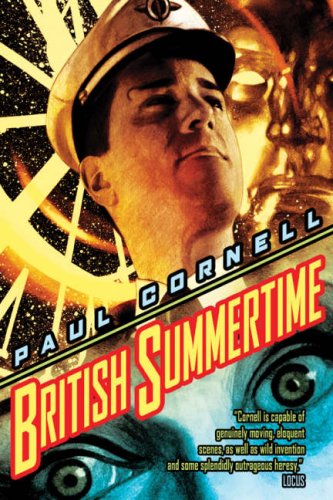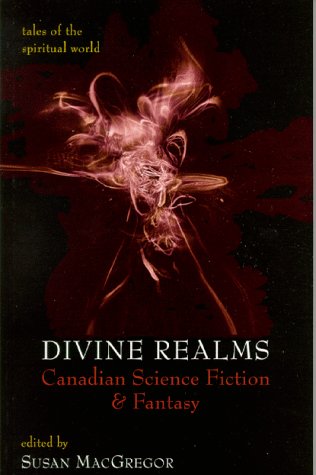Science fiction and Christianity
Explore the best Christian science fiction books blending faith and futuristic themes. Discover inspiring stories where Christianity meets sci-fi in thrilling, thought-provoking narratives.

Book
A Canticle for Leibowitz
by Walter M. Miller
Winner of the 1961 Hugo Award for Best Novel and widely considered one of the most accomplished, powerful, and enduring classics of modern speculative fiction, Walter M. Miller, Jr.'s A Canticle for Leibowitz is a true landmark of twentieth-century literature -- a chilling and still-provocative look at a post-apocalyptic future. In a nightmarish ruined world slowly awakening to the light after sleeping in darkness, the infant rediscoveries of science are secretly nourished by cloistered monks dedicated to the study and preservation of the relics and writings of the blessed Saint Isaac Leibowitz. From here the story spans centuries of ignorance, violence, and barbarism, viewing through a sharp, satirical eye the relentless progression of a human race damned by its inherent humanness to recelebrate its grand foibles and repeat its grievous mistakes. Seriously funny, stunning, and tragic, eternally fresh, imaginative, and altogether remarkable, A Canticle for Leibowitz retains its ability to enthrall and amaze. It is now, as it always has been, a masterpiece.

Book
A Case of Conscience
by James Blish
Winner of the Hugo Award • The future of Earth will rely upon one man’s sense of right and wrong. . . . Father Ruiz-Sanchez is a dedicated man—a priest who is also a scientist, and a scientist who is also a human being. He has found no insoluble conflicts in his beliefs or his ethics . . . until he is sent to Lithia. There he comes upon a race of aliens who are admirable in every way except for their total reliance on cold reason; they are incapable of faith or belief. Confronted with a profound scientific riddle and ethical quandary, Father Ruiz-Sanchez soon finds himself torn between the teachings of his faith, the teachings of his science, and the inner promptings of his humanity. There is only one solution: He must accept an ancient and unforgivable heresy—and risk the futures of both worlds . . .


Book
Litany of the Long Sun
by Gene Wolfe
This omnibus of "Nightside of the Long Sun" and "Lake of the Long Sun" is this "modern-day Homer" ("Washington Post Book World") at his best.


Book
The Sparrow
by Mary Doria Russell
A visionary work that combines speculative fiction with deep philosophical inquiry, The Sparrow tells the story of a charismatic Jesuit priest and linguist, Emilio Sandoz, who leads a scientific mission entrusted with a profound task: to make first contact with intelligent extraterrestrial life. The mission begins in faith, hope, and beauty, but a series of small misunderstandings brings it to a catastrophic end. Praise for The Sparrow “A startling, engrossing, and moral work of fiction.”—The New York Times Book Review “Important novels leave deep cracks in our beliefs, our prejudices, and our blinders. The Sparrow is one of them.”—Entertainment Weekly “Powerful . . . The Sparrow tackles a difficult subject with grace and intelligence.”—San Francisco Chronicle “Provocative, challenging . . . recalls both Arthur C. Clarke and H. G. Wells, with a dash of Ray Bradbury for good measure.”—The Dallas Morning News “[Mary Doria] Russell shows herself to be a skillful storyteller who subtly and expertly builds suspense.”—USA Today


Book
Doomsday Book
by Connie Willis
Connie Willis draws upon her understanding of the universalities of human nature to explore the ageless issues of evil, suffering, and the indomitable will of the human spirit. “A tour de force.”—The New York Times Book Review For Kivrin, preparing to travel back in time to study one of the deadliest eras in humanity’s history was as simple as receiving inoculations against the diseases of the fourteenth century and inventing an alibi for a woman traveling alone. For her instructors in the twenty-first century, it meant painstaking calculations and careful monitoring of the rendezvous location where Kivrin would be received. But a crisis strangely linking past and future strands Kivrin in a bygone age as her fellows try desperately to rescue her. In a time of superstition and fear, Kivrin—barely of age herself—finds she has become an unlikely angel of hope during one of history’s darkest hours.

Book
Eifelheim
by Michael Flynn
The alien world of medieval Europe lives again, transformed by the physics of the future, by a winner of the Heinlein Award Over the centuries, one small town in Germany has disappeared and never been resettled. Tom, a historian, and his theoretical physicist girlfriend Sharon, become interested. By all logic, the town should have survived. What's so special about Eifelheim? Father Dietrich is the village priest of Eifelheim, in the year 1348, when the Black Death is gathering strength but is still not nearby. Dietrich is an educated man, and to his astonishment becomes the first contact person between humanity and an alien race from a distant star, when their ship crashes in the nearby forest. It is a time of wonders, in the shadow of the plague. Flynn gives us the full richness and strangeness of medieval life, as well as some terrific aliens. Tom and Sharon, and Father Deitrich have a strange destiny of tragedy and triumph in Eifelheim, the brilliant science fiction novel by Michael Flynn.


Book
The Three Stigmata of Palmer Eldritch
by Philip K. Dick
In this wildly disorienting funhouse of a novel, populated by God-like--or perhaps Satanic--takeover artists and corporate psychics, Philip K. Dick explores mysteries that were once the property of St. Paul and Aquinas. His wit, compassion, and knife-edged irony make The Three Stigmata of Palmer Eldritch moving as well as genuinely visionary.

Book
The Man in the High Castle
by Philip K. Dick
It's America in 1962. Slavery is legal once again. the few Jews who still survive hide under assumed names. In San Francisco the I Ching is as common as the Yellow Pages. All because some 20 years earlier the United States lost a war--and is now occupied jointly by Nazi Germany and Japan. This harrowing, Hugo Award-winning novel is the work that established Philip K. Dick as an innovator in science fiction while breaking the barrier between science fiction and the serious novel of ideas. In it Dick offers a haunting vision of history as a nightmare from which it may just be possible to awake.

Book
Do Androids Dream of Electric Sheep?
by Philip K. Dick
A masterpiece ahead of its time, a prescient rendering of a dark future, and the inspiration for the blockbuster film Blade Runner One of The Atlantic’s Great American Novels of the Past 100 Years By 2021, the World War has killed millions, driving entire species into extinction and sending mankind off-planet. Those who remain covet any living creature, and for people who can’t afford one, companies built incredibly realistic simulacra: horses, birds, cats, sheep. They’ve even built humans. Immigrants to Mars receive androids so sophisticated they are indistinguishable from true men or women. Fearful of the havoc these artificial humans can wreak, the government bans them from Earth. Driven into hiding, unauthorized androids live among human beings, undetected. Rick Deckard, an officially sanctioned bounty hunter, is commissioned to find rogue androids and “retire” them. But when cornered, androids fight back—with lethal force. Praise for Philip K. Dick “The most consistently brilliant science fiction writer in the world.”—John Brunner “A kind of pulp-fiction Kafka, a prophet.”—The New York Times “[Philip K. Dick] sees all the sparkling—and terrifying—possibilities . . . that other authors shy away from.”—Rolling Stone


Book
British Summertime
by Paul Cornell
The lives of five people collide: a woman who can read anything, from body language to the shape of a city; a pilot from the future; a spy; a killer; and a head without a body. The end of the world is coming, and only they can stop it. Their journey reaches back to the days of the New Testament, and forward to the end of time.




Book
Out of the Silent Planet
by C.S. Lewis
Written during the dark hours immediately before and during the Second World War, C. S. Lewis's Space Trilogy, of which Out of the Silent Planet is the first volume, stands alongside such works as Albert Camus's The Plague and George Orwell's 1984 as a timely parable that has become timeless, beloved by succeeding generations as much for the sheer wonder of its storytelling as for the significance of the moral concerns. For the trilogy's central figure, C. S. Lewis created perhaps the most memorable character of his career, the brilliant, clear-eyed, and fiercely brave philologist Dr. Elwin Ransom. Appropriately, Lewis modeled Dr. Ransom after his dear friend J. R. R. Tolkien, for in the scope of its imaginative achievement and the totality of its vision of not one but two imaginary worlds, the Space Trilogy is rivaled in this century only by Tolkien's trilogy The Lord of the Rings. Readers who fall in love with Lewis's fantasy series The Chronicles of Namia as children unfailingly cherish his Space Trilogy as adults; it, too, brings to life strange and magical realms in which epic battles are fought between the forces of light and those of darkness. But in the many layers of its allegory, and the sophistication and piercing brilliance of its insights into the human condition, it occupies a place among the English language's most extraordinary works for any age, and for all time. Out of the Silent Planet introduces Dr. Ransom and chronicles his abduction by a megalomaniacal physicist and his accomplice via space ship to the planet Malacandra. The two men are in need of a human sacrifice and Dr. Ransom would seem to fit the bill. Dr. Ransom escapes upon landing, though, and goes on the run, a stranger in a land that, like Jonathan Swift's Lilliput, is enchanting in its difference from Earth and instructive in its similarity.

Book
The Wrinkle in Time Quintet
by Madeleine L'Engle
A boxed set of five volumes featuring the Murray children and their friends as they travel through time and encounter strange creatures.

Book
The Necessary Beggar
by Susan Palwick
Praised as "a deeply felt, deeply moving tale . . . chilling and finely tuned" (Publishers Weekly), Susan Palwick's first novel Flying in Place won widespread acclaim for its haunting exploration of a troubled childhood. Now, after a decade, Palwick returns with the powerful tale of a family cast out of an idyllic realm, learning to live in our own troubled world--an exciting and insightful examination of humanity in the spirit of Ursula Le Guin's The Disposessed and Robert Heinlein's Stranger in a Strange Land. Lémabantunk, the Glorious City, is a place of peace and plenty. But it is also a land of swift and severe justice. Young Darroti has been accused of the murder of a highborn woman who had chosen the life of a Mendicant, a holy beggar whose blessing brings forgiveness. Now his entire family must share his shame, and his punishment--exile to an unknown world. Grieving for the life they have left behind, Darroti and his family find themselves in a hostile land--an all-too-familiar American future, a country under attack in a world torn by hatred and war. There, each tries to cope in their own way. Some will surrender to despair. Some will strive to preserve the old ways. Some will be lured by the new world's temptations. And some, sustained by extraordinary love, will find a way to heal the family's grief and give them hope.

Book
The Speed Of Dark
by Elizabeth Moon
Journeys inside the mind of Lou Arrendale, an autistic man, who is asked to undergo a new, experimental treatment designed to cure autism, as he struggles with the question of whether or not he should risk a medical procedure that could make him "normal." Reprint.

Book
The Iron Bridge
by David E. Morse
A woman from the 21st century travels back in time to 1773 England to cause the collapse of a bridge under construction. An ecological commune in the U.S. hopes this will derail the Industrial Revolution, thus saving the world from its consequences.

Book
The Children of Men
by P. D. James
In 2021, with the human race becoming extinct because of the infertility of all males, Oxford historian Theodore Faron is drawn into the schemes of an unlikely group of revolutionaries out to save society.








Book
The Gospel According to Science Fiction
by Gabriel Mckee
Explores the theological nature of science fiction, drawing on examples from television, literature, and films to explain how science fiction can help people understand not only who they are but who they will become.

Book
Pink Beams of Light from the God in the Gutter
by Gabriel Mckee
In Pink Beams of Light from the God in the Gutter, Gabriel McKee gives an overview of Dick's religious experiences and his attempts at communicating them in published works, drawing on Dick's fiction as well as his private journals and personal correspondence